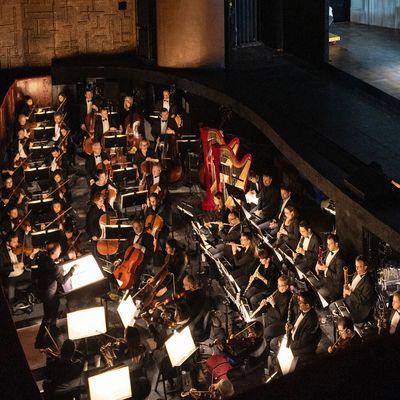
The dismantling of America’s cultural infrastructure has begun. The Metropolitan Opera will furlough all its union employees—musicians, chorus members, stagehands, carpenters, and other trades—starting April 1. The company told employees on Thursday that it hopes to reopen on schedule in September, and until then union members will receive health insurance but no paychecks. During the months they won’t be paid, the Met will waive the weekly contributions employees otherwise make for healthcare. Non-union staff, including members of management, aren’t being furloughed, but senior staff will take pay cuts. General manager Peter Gelb will give up his salary for the duration of the disruption, the company said.
“As devastating as it is to have to close the Met, this was the rare instance where the show simply couldn’t go on,” Gelb said in a statement. “We send our thanks to our loyal audiences and we’re doing our best to support our employees during this extraordinarily difficult time. We look forward to being reunited in the fall with a new season.”
The Met employs 3,000 people, and most of them belong to Local 802 of the American Federation of Musicians, the American Guild of Musical Artists, and several locals of the International Alliance of Theatrical Stage Employees. On Wednesday evening, the unions scrambled to reassure members that they would not be left destitute during the furlough. In an interview, Gelb said that abridging the season by ten weeks would blow a gigantic hole in the company’s $300 million annual operating budget. About two-thirds of that budget goes to labor costs, including fees for visiting artists, which will also go unpaid. “In spite of the fact that we’re in a force majeure situation, we’ve extended payments through the end of March,” he said. “That’s a significant step, not contractually required. We’re trying to do the right thing, given the financial resources that are available.”
According to an email sent by Local 802’s Metropolitan Orchestra Committee to union musicians, the Met will continue to provide instrument insurance. Paid sick leave and accrued vacation can’t be used during the furlough, but union members can use it later. Crucially for the union, the committee said that “it is understood” that the terms of the collective bargaining agreements will be reinstated in September when the Met re-opens, and that the settlement setting forth the terms of the furlough period will not establish a precedent for future negotiations. Members of the committee will also meet with Gelb throughout the month of April, to discuss the company’s fundraising and the closure’s financial impact on workers.
In a statement to the press on Thursday afternoon, the leadership of Local 802 said it supported the Met for taking steps to protect workers, but added, “These professionals, many with families who rely on their paychecks, are now facing the prospect of no income for an extended period of time. We believe that immediate governmental assistance is essential to avoid a brutal outcome for these musicians.” The union expanded on this demand in a separate second statement, which called on Mayor Bill de Blasio and Governor Andrew Cuomo to collaborate on an emergency relief package for arts workers, including freelancers. It’s seeking legislation that will guarantee furloughed workers access to health care and unemployment benefits.
Len Egert, the executive director of the American Guild of Musical Artists, told Vulture that the union had reached a similar settlement for its members, which include choristers, stage managers, directors, and dancers. Full-time union members will be paid through March 31, and keep their health insurance. As for the union’s collective bargaining agreement with the Met, Egert said, “We hope that [the Met] is going to open in September. First of all, we know that’s not a foregone conclusion. If hopefully it does open in September, we have an existing collective-bargaining agreement covering all those group I mentioned.” Artists who are hired per performance will be covered by a different settlement, the details of which are still being worked out. Egert said the union first entered negotiations regarding the furlough settlement on March 15.
“We certainly understand these are extremely difficult times. And we’re all going to have to work together to to allow the art form to continue and for the Met to start operations again,” Egert added. “This is no doubt going to take huge financial toll on the Met. It’s also going to take a devastating toll on our members.” As is generally the case for all unions, AGMA has financial assistance available for members in distress.
Members of IATSE, meanwhile, received an email from James Claffey, the president of the union’s Local One, on Thursday morning. Claffey wrote that further news about the details of the union’s specific agreement with the Met would be forthcoming, but reminded members that the local’s Annuity Hardship Distribution Option could provide up to $30,000 worth of assistance to individuals.
The relationship between the Met and its unions has occasionally turned hostile in the past. Union members accepted significant pay cuts in 2015. The company has been in tough financial straits for years, often struggling to fill the 3,800-seat house and relying ever more heavily on donations rather than box-office income. Gelb sounded alarm bells in 2014 when he said that the Met could go bankrupt within a couple of years. Labor negotiations, the rising costs of producing a hugely expensive art form, and a series of bitter divisions over sexual improprieties by two of its marquee names—former music director James Levine and tenor Plácido Domingo—have all taken a toll. A decade ago, New York City Opera faced a similar but more drastic decline, which ultimately wound up shuttering the company. In recent years, it’s been clear that even a mammoth artistic enterprise like the Met doesn’t have a guaranteed future. “The Met has been financially mismanaged for a decade, and there was always going to be a reckoning,” said one orchestra member. “It’s plausible to me that Peter [Gelb] will use this crisis to declare bankruptcy or get out from under pension obligations. This was always my biggest fear: that the Met was going to be skating on thin ice for years and there was going to be some big shock.”
Gelb firmly rejected that notion, and the idea that the Met is uniquely vulnerable. “This is affecting the entire world,” he said. “It’s a challenging time, but the Met is managed with great fiscal acuity and responsibility, and has been for years. The economics of opera are not good, but we’ve been extremely innovative with programs like movie-theater transmissions and, this year, adding Sunday matinees. We’re constantly devising new ways to increase revenues.” The Met launched an immediate $50 million fundraising campaign to get it through the crisis, and Gelb said the board had come up with $11 million literally overnight.
Although the company goes on hiatus every summer, reassembling an enormous institution after nearly six months off—assuming conditions have eased even then—will not be easy. Many employees will have few options: the orchestra world is on hold everywhere, and the Met chorus is the only full-time professional ensemble in the country. But as the months drag on, some artists and backstage personnel may drift to other careers and other parts of the country. Meanwhile, the Met will draw on its old glories, offering a free live stream of a different opera every night. Even with the house dark, the audience remains vast and global: one-day traffic on the Met website reached 477,000 visitors yesterday, most of them jamming the circuits to watch a free stream of Verdi’s Il Trovatore. The streams will continue as long as the crisis does, Gelb promised. “That’s part of keeping the bond between the Met and our audience.”
Editor’s note: This story has been updated with comments from union representatives and general manager Peter Gelb.




